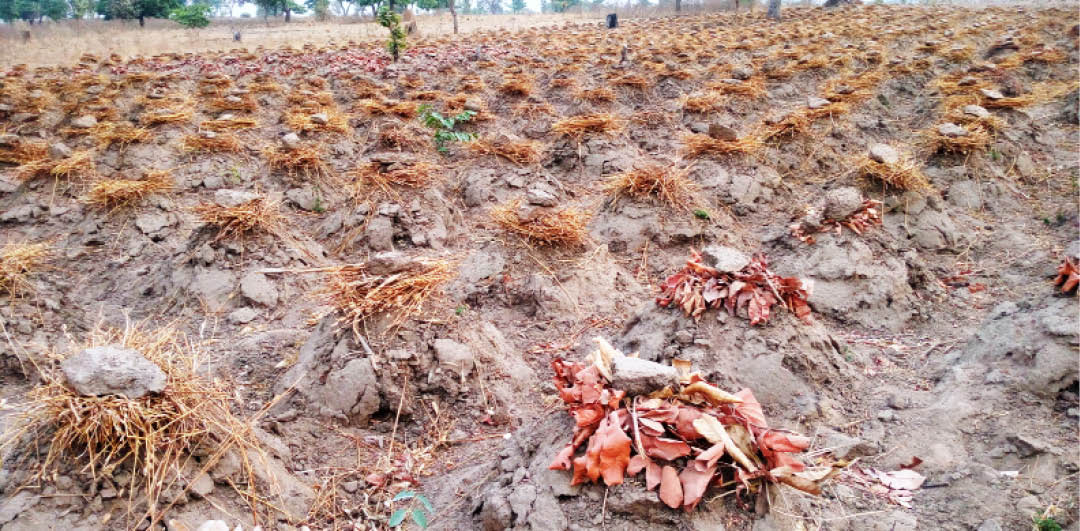Yam farmers now avoid early planting
Yam farmers in Benue State are anxiously awaiting the commencement of the rainy season to commence planting of their seedlings as they have already prepared their farmlands. Some of the farmers told our correspondent in Makurdi that they prepared their large expanses of land with large number of heaps since December, 2018 to January this […]

Yam farmers in Benue State are anxiously awaiting the commencement of the rainy season to commence planting of their seedlings as they have already prepared their farmlands.
Some of the farmers told our correspondent in Makurdi that they prepared their large expanses of land with large number of heaps since December, 2018 to January this year and are awaiting the rains to commence planting.
Tondo Matthew Kumbur, a yam farmer in Gboko area of the state said his yam farm had been ready since January this year, adding that he was only waiting for next month (when the rains would have started) to plant his yam seedlings.
“I have prepared the land. I will begin to plant my yam between from April 20. It is only those who don’t know much about farming that plant their yam early. Doing so could cause the seedlings to rot before the rains start. It is not advisable to plant it so early.
“If you plant early, the seedlings will go bad. But when the rainy season gets closer, a farmer can begin to plant and I’m looking at two weeks from now to start planting. There are also categories of people who planted early but mulch the heaps so that the intensity of the heat does affect the yam. If they are lucky, the seed will remain good,” Kumbur said.
Similarly, a female yam farmer in Ogobia-Otukpo axis of the state, Ada Hyacinth, said she has not contemplated planting her yam seedlings yet because of the heat as the yield would not turn out good.
Though, Hyacinth posited that some farmers in her locality had planted their yam since January, this year, they relied on mulching to cultivate such farms.
But, Victor Anyebe of the same locality in Otukpo who has already cultivated at least 200 heaps in his yam farm said he did so based on the advice of some experienced elders who believed that the yam planted before the rain would do much better.
“So I’m doing my own gradually just to see how it would turn out at the end of the season,” Anyebe added.
For Vitalis Tarnongu, though a big time farmer in Makurdi, said he doesn’t concentrate much on yam but he had already planted some for the season.
A former Benue State chairman of the All Farmers Association of Nigeria (AFAN), Aondona Hembe Kuhe, however said despite early or late planting of yam; what would matter most is good agronomy practice coupled with good seedlings. He said yam production seemed to be on a rapid increase in the state.
He said the over 4000 registered farmers of the Yam Commodity Association in the state, which he recently handed-over to the new executives of AFAN in the state, are quite aware through regular sensitisation of where they could get good seedlings.
He added that because almost every home in Benue produced yam, it would be advisable for them (farmers) to link up with the farmers’ association for up-to-date information to upgrade their production capacity.
Meanwhile, a Seed Systems Principal Investigator at the Federal University of Agriculture, Makurdi (FUAM), Teryima Iorlamen, has explained that farmers can plant their yam as soon as the rain stabilises.
Iorlamen, noted that, “some people plant their yam during dry season, that is between January and March. However, the farmer who is planting at such period should be conscious of the sun. Because the temperature would be high.
“One of the recommended agronomy activities is that, the farmer must mulch, meaning that he gets material and put on-top of the heaps and also put sand so as to reduce the intensity of the sun on the yam heaps.
“That should be done properly, otherwise, it would lead to the decay of the yam seedlings. Another reason why people plant at this time is because they feel it will encourage decay of yam material so that once rain stabilises, it would continue growth and development.”
Iorlamen nevertheless advised farmers to plant as soon as the rain stabilises, stressing that, “sometimes, even when the first rain comes, the heat in the soil is much but when the rain stabilises, the temperature is favourable and the moisture content is enough for the crop to germinate.”
